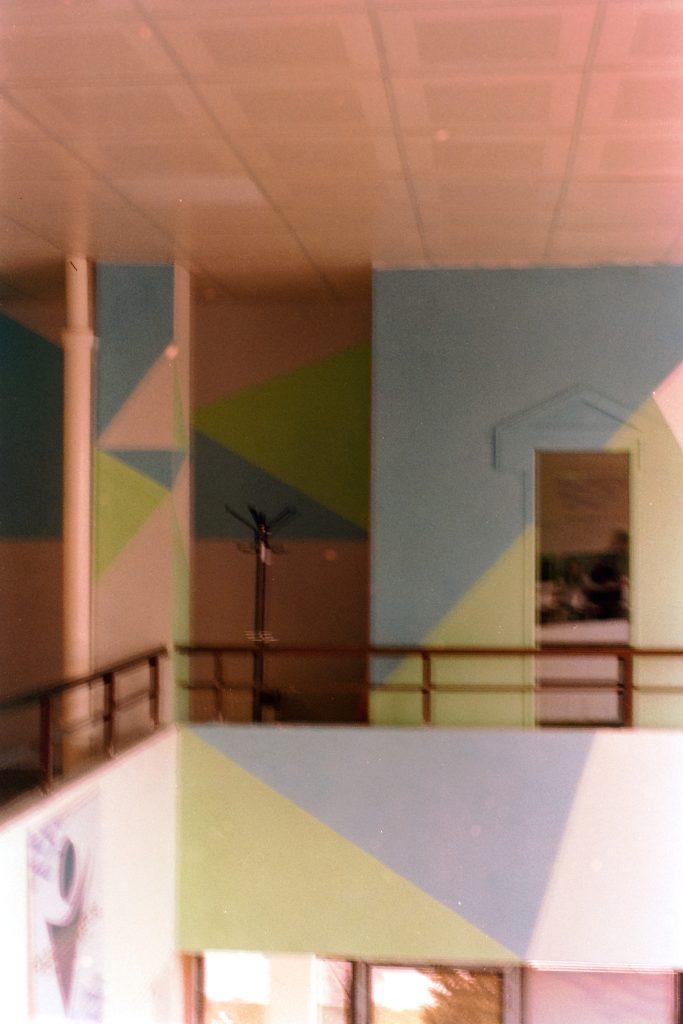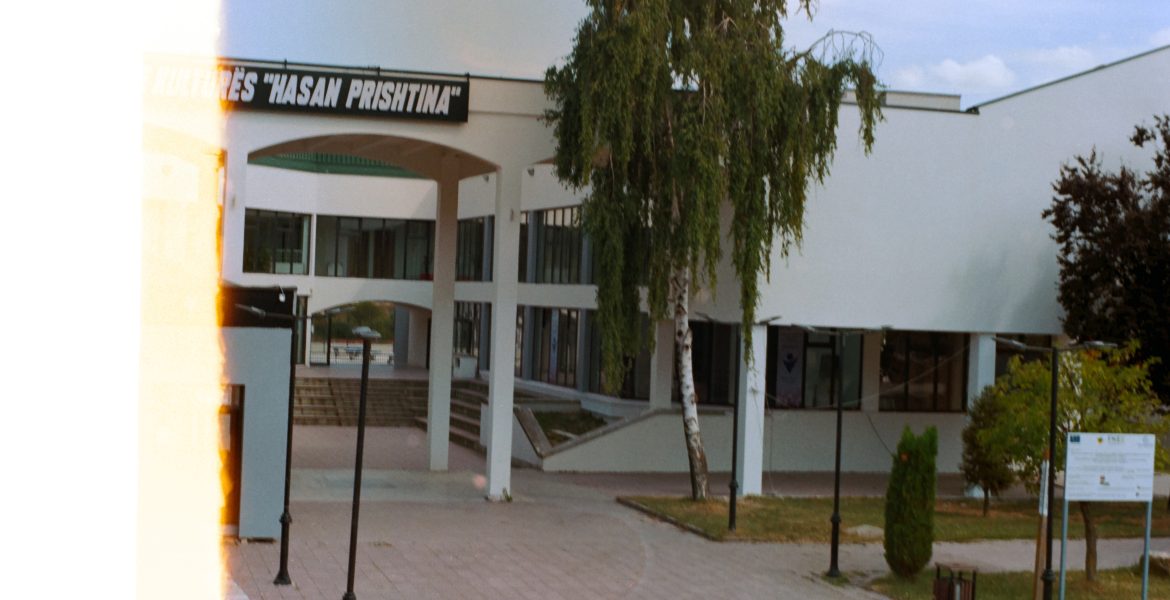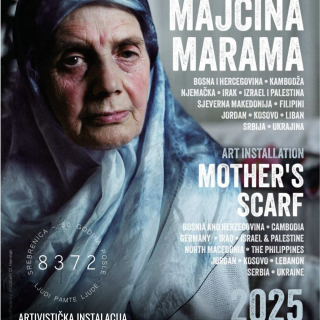The young people of the post-war generation in the Drenica region of Kosovo have come of age in a unique and complex context shaped by the aftermath of conflict and war. Growing up in the shadow of the Kosovo War in 1998/1999 these individuals have witnessed the enduring effects of conflict on their families, communities, and the region as a whole. Despite the progress made towards peace and stability, the scars of war remain evident in the physical infrastructure, social dynamics, and economic opportunities of their environment.
The project “Capturing Memories, Creating Stories”, is a joint initiative with the Qendra Rinore Publike Skenderaj/Public Youth Center Skenderaj, through which we had a look into the stories of the young people from Skenderaj and the Drenica region and have them told through their eyes and words. Which places, memories, sites and people are included in these stories?
In order to capture and tell those stories, two mediums were used: analogue photography and storytelling. The reason why analogue photography was used in contrast to digital photography is due to the fact that the analogue process of shooting, developing, and printing photographs can be metaphorically linked to the process of memory formation and memorialization. Just as memories evolve over time and may change in our minds, analogue images also undergo transformations during the development process. It also embraces imperfections: Analog photography often produces unexpected and unpredictable results due to variations in film, exposure, and development. These imperfections can beautifully mirror the imperfect and subjective nature of memories, sometimes blurry and imperfect, making the images feel more genuine and personal.
The photography workshop was conducted by Flamur Qorrolli and the writing workshop by Visar Xhambazi.
The selected photographs by the participants as well as the stories written about them had a wide variety, showing the diversity in realities of the young people in the Drenica region as well as which stories they would like to tell: pictures related to traditional handcrafts, photographs from a primary school and the house of Adem Jashari in Prekaz were among the memories captured but also different landscapes and a mosque.
















Here are some of the stories told by the participants about the memories they decided to capture:
“A Golden Tradition” by Aida Misimi
I am Aida Misimi, a student at the Faculty of Education. I will tell a personal story.
In a corner of my house, on the wall, there hangs a family picture tree. Beneath that tree, there is a radio we listen to every morning. Sometimes, I feel like smashing it or tossing it away somewhere, but not today. Today, an interview that could be heard all around the house piqued my curiosity. The interview was about women’s rights and their struggles over the years. It spoke of our grandmothers, and even criticized certain aspects of our tradition.
I pause for a moment and glance at the family tree. My mother, standing behind me, begins to speak. “See how beautiful grandmother looked in her traditional attire. Look here, that’s you when you were young, ahh, you looked so charming in your pshallak[1], you would wear it to every family gathering.” I steal a glance at my mother, and she continues, “Women have indeed had a complex past, burdened with lots of chores but few rights. However, it was not always as some people claim today, seeking attention by pretending to champion women’s rights. In the past, women lacked a voice and the right to get jobs beyond household chores and caring for family members. We cannot blame tradition for that, as this was the norm worldwide. Thankfully, through protests and rebellions, we gained these rights, and now women have the freedom to find jobs in the field they desire. They are no longer confined to domestic roles but instead enjoy full rights as members of the society. Women fought for these rights and achieved them, marking a significant victory. Yet, there are some aspects in which a woman cannot be equal to a man and the same goes for the males too, who in some aspects, can never compare to a woman. We have a colourful tradition and we should not blame it for diminishing women, because that used to be universal.”
I look at the pictures carefully. They are filled with memories of love, sincerity, closeness, so many smiles as well as physical pain – perhaps even soul-deep pain. But everyone stood united. Nowadays, I seldom meet many family members, rarely see my relatives. How did we become so distant from each other? Is it not our tradition to support one another, to love and respect and not go back on our promises?
We have such a golden tradition, let us not ever tarnish or forget it.
Story by Ervin Nimani
I am Ervin Nimani. I am 17 years old and I hail from the beautiful village of Runik. Let us go back in time, in the days when I was a small child and my city was a wonderful place for adventures and great times.
One day, when I was around 8 years, something that I will never forget happened. It was a bright sunny morning. My friends and I decided to go on a bicycle ride around the forest surrounding our village. Our small bicycles rattled along the stone-paved roads, and time passed with strange speed.
When we reached the mountain top, the view was breathtaking. We could see our entire town from the mountain’s height and the clouds reminded me of the colour of the sea. That was an extraordinary feeling, a freedom I could not describe in words.
Those early childhood adventures made me realize that our small town had a lot of rich history waiting to be discovered. And now, at the age of 17, I remember those days with nostalgia and pride for being a part of the adventures of my childhood in our beautiful Runik.
Story by Shkelqim Avdullahi
I am Shkëlqim Avdullahi from the village of Çitak. I am 17 years old and live with my parents, my brother, and my sister. I completed my primary education at “Shotë Galica” school in Runik. For high school, I chose the natural sciences track. I am currently in the twelfth grade. My life is full of challenges and adventures that I have experienced with my family and friends. Some events were sad, while others were joyful, but when I look back, I remember only the happy ones. One of the memories that stands out in my mind the most is my early fascination with patriotism and the history of our people. Since I was young, there was a lot of talk about the history of our country in the environment where I lived. In many places I visited, I would notice the national red and black flag. At that time, I was young, and I did not understand the significance of the flag, but within me, there was a fire that could not be extinguished until I understood the purpose of the red and black flag. A few years later, I started first grade. While going through the alphabet book, I saw the same flag I noticed everywhere. Beside it, there was a poem dedicated to the love for the red and black flag.
I became obsessed with that poem, and despite my aversion to assignments and reciting poetry, I eagerly read that poem. Growing up, my passion to learn more about the flag and the history of my country also grew. Most of my friends hated history lessons at school, but I listened to every word and tried to remember it all. This interest led me to research beyond the classroom. My only source was my father and the elderly people, so I would ask my father about stories related to our country, and the stories I heard were magnificent. Through those stories, I understood that our country had been occupied for a long time by various invaders. Those stories made me realize how unique we are as a nation and how we must give our best to make a difference in the future of our country. All the signs I saw and the stories I heard as a child became an indomitable source of inspiration for my dream to work and help my country as much as possible towards a better future. This makes me understand that motivation can also be found in the simplest things around us, like a flag on the wall or a photo in an alphabet book. We just need to start searching. In a world where children’s dreams fade as they grow up, my dream grew along with me. And this dream carries a message to all dreamers in the world: regardless of what others say about your dreams, remember that no dream is too big, and no dreamer is too small.
“A Fortunate January Afternoon” by Bleard Meha
My name is Bleard Meha. I was born in 2004, in Skënderaj. I completed my elementary and high school education in the same city. Currently, I am a student at the University of Prishtina, Department of Journalism at the Faculty of Philology. Additionally, I am a writer and the author of a book titled “Travelers Who Forget.”
My childhood has known different paths, where memories have taken root. It is filled with various scenes of situations that speak to me, sometimes strongly. These are the sources that drive me to write. Something similar, I would give as a response to my interviewer, in the moments of sending my writings from my phone to the computer. It was a new feeling, a different one, as if from another time. I felt more grown-up, more mature, and consequently more serious. Well, I was writing a book! I was 17 years old at that time, still in high school, and in the final stages of submitting my materials to the publishing house. Who would have thought of that earlier? I had not even dared to dream of it… I had worked in silence for a relatively short time. I kept my sacred mission of writing poetry a secret for as long as I was engaged in it. Even my family was unaware of this special, exciting initiative… I almost felt like one of those secret agents who carry the fate of a society, or even the entire world, on their shoulders… “Bashkim, your son has talent!” said the writer to my father after reading my poems. I did not know how to react; even today, I remember that moment in a haze of blur. My father knew the writer’s family, and immediately, from my point of view, delicately, he arranged a meeting with him. He felt indebted! Everything happened one January afternoon. Although I do not remember if there was heavy snow that year, January was white for me. Nevertheless, after the meeting, I had mixed feelings in my body. But what about my father; how did he feel after that meeting? Was he proud of his son?
The meetings continued. Now, we were going out for a conversation, just the writer and me. An interesting connection was forming between him and me. He was a good connoisseur of literature; he was the one who opened for me the doors to a fascinating world, full of colours… Oh, God, now I also had a brush in my hand, and I was painting on a new canvas, in a new chapter! …and yes, of course, now I had a new friend, so special.
P.S. I should not forget to mention that we are now colleagues!
[1] Traditional women’s costume.




